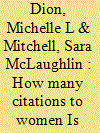| Srl | Item |
| 1 |
ID:
168716


|
|
|
|
|
| Summary/Abstract |
Gender representation is a pervasive problem in political science. We draw on evidence from the 2017 and 2018 American Political Science Association (APSA) Annual Meeting programs to discuss diversity and representation in large political science disciplinary conferences. APSA program divisions differ substantially in their gender representation: although some are representative of their organized-section membership, others are not, and some sections are particularly likely to feature “manels.” We present representation data by organized section, with discussions of what representation looks like and identifying different types of representation goals. We conclude by offering guidelines for increasing gender representation, for both future submitters and program chairs.
|
|
|
|
|
|
|
|
|
|
|
|
|
|
|
|
| 2 |
ID:
160329


|
|
|
|
|
| Summary/Abstract |
Core graduate-level seminars, in many ways, establish the “canon” literature for scholars entering a discipline. In the study of American Politics, the contents of this canon vary widely across departments and instructors, with important implications for the perspectives to which graduate students are exposed. At a basic level, the demographic characteristics of the authors whose work is assigned can have a major impact on the diversity (or lack of diversity) of viewpoints presented in these introductory courses. Using a unique dataset derived from a survey of core American Politics graduate seminars at highly-ranked universities, this project assesses the gender diversity of the authors whose research is currently taught—overall and within a comprehensive list of topics and subtopics. We also assess the “substantive representation” of women (and other underrepresented groups) within the American Politics canon by examining the frequency with which gender, racial, and other forms of identity politics are taught in these introductory courses.
|
|
|
|
|
|
|
|
|
|
|
|
|
|
|
|
| 3 |
ID:
171287


|
|
|
|
|
| Summary/Abstract |
Recent studies identified gendered citation gaps in political science journal articles, with male scholars being less likely to cite work by female scholars in comparison to their female peers. Although journal editors, editorial boards, and political scientists are becoming more aware of implicit biases and adopting strategies to remedy them, we know less about the proper baselines for citations in subfields and research areas of political science. Without information about how many women should be cited in a research field, it is difficult to know whether the distribution is biased. Using the gender distribution of membership in professional political science organizations and article authors in 38 political science journals, we provide scholars with suggested minimum baselines for gender representation in citations. We also show that women represent a larger share of organization members than the authors in sponsoring organizations’ journals.
|
|
|
|
|
|
|
|
|
|
|
|
|
|
|
|